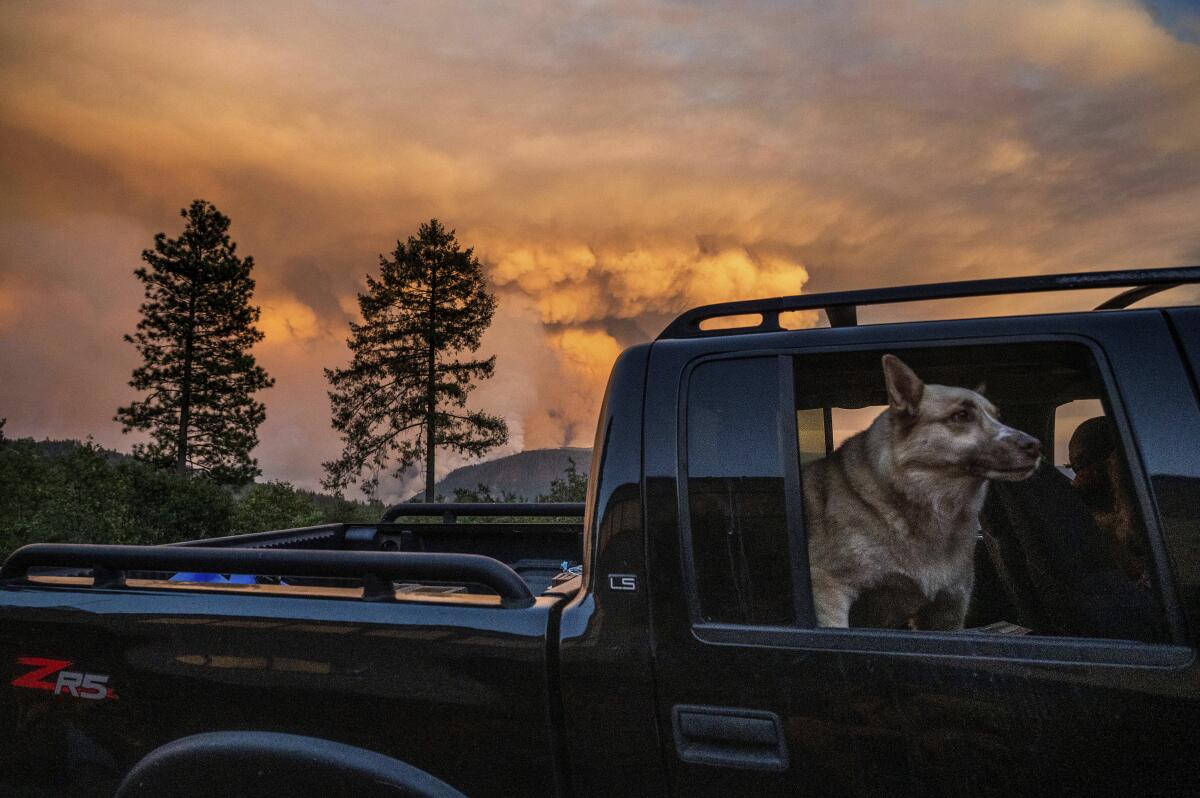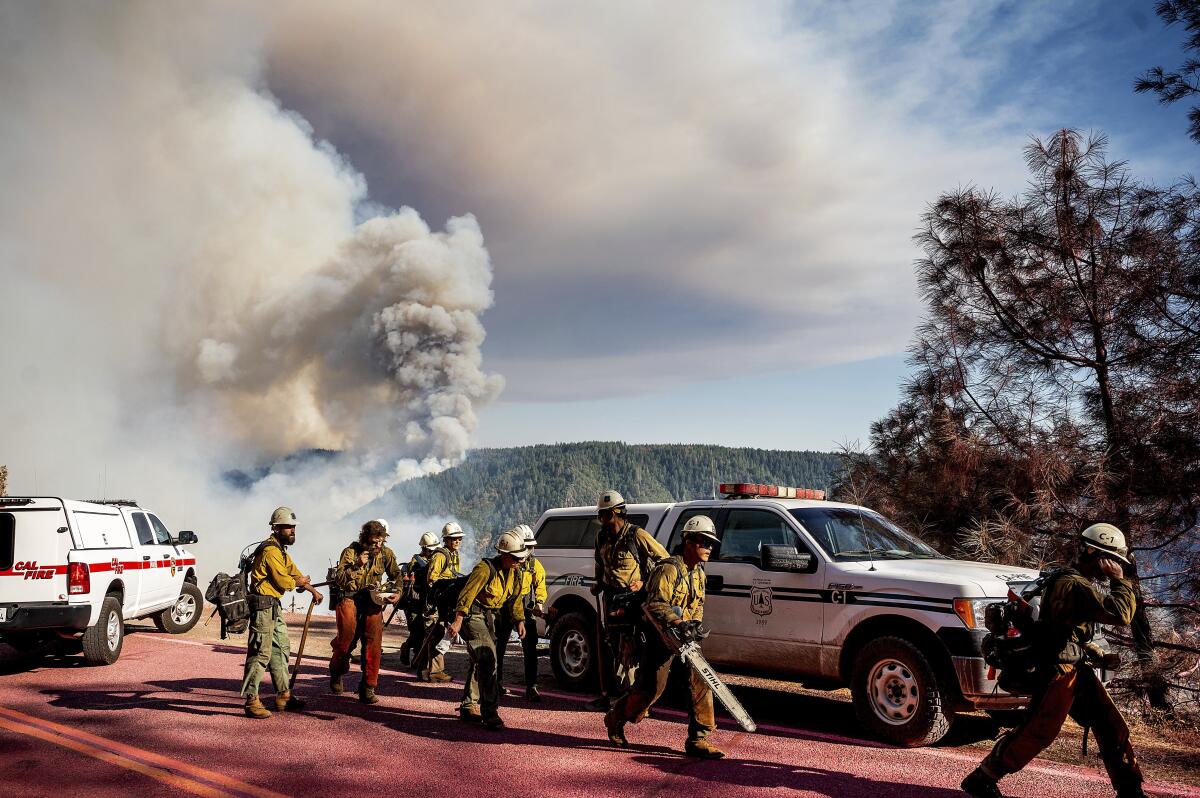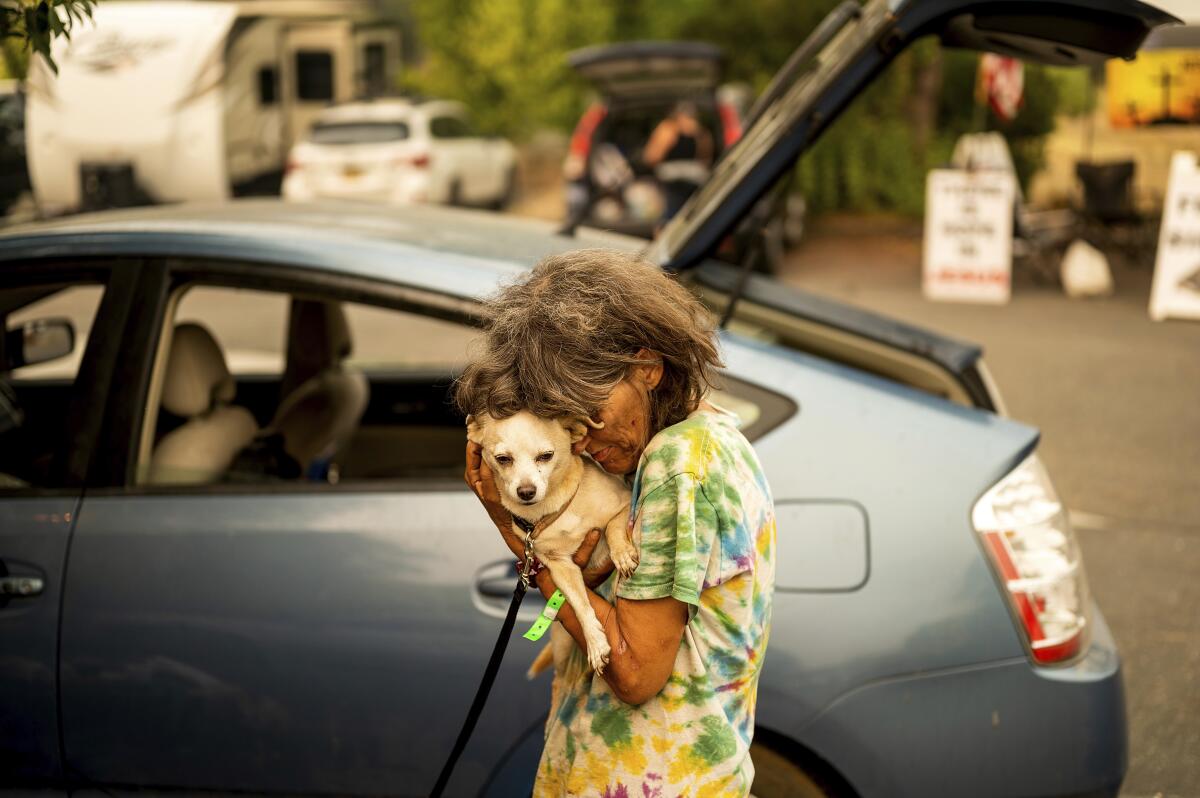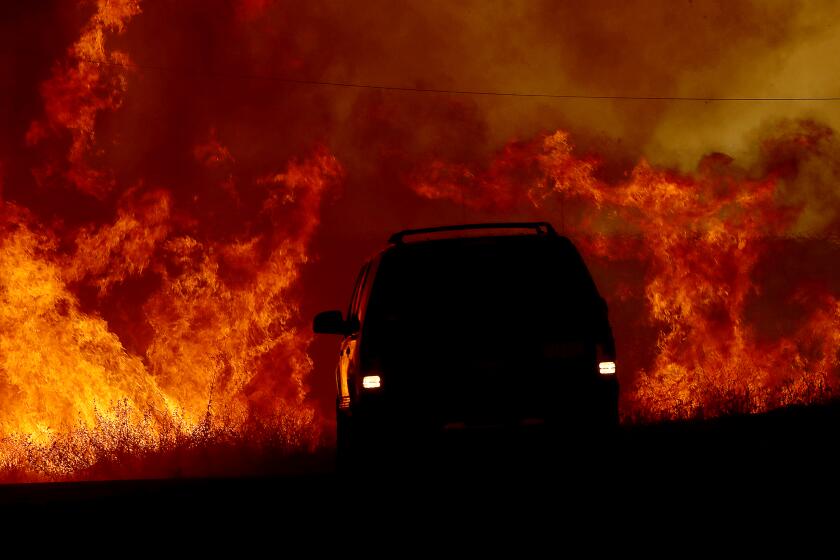Thousands flee Mosquito fire, still growing without containment west of Tahoe

- Share via
SACRAMENTO — Cristina McMillan knew she didn’t have much time — the flames were encroaching, the smoke was choking, and the Mosquito fire had already torn through thousands of acres near her home in the Sierra foothills, east of Sacramento.
Nevertheless, as they fled Georgetown on Thursday with as much as they could gather, McMillan and her husband took the winding road out slowly. They had no choice. They had demanding passengers.
Ten cats.
“So much meowing,” McMillan recalled. “They don’t like the turns. … If I took a turn too fast, the cats [were] just screaming in the back.”
It was unclear how many people had fled the Mosquito fire by Friday, but at least 8,000 in Placer and El Dorado counties were under evacuation orders, with hundreds of thousands watching nervously to see if the blaze would roar their way. As of Saturday at 8:36 a.m., the fire had consumed 33,754 acres, and was slowly growing with no containment.
Eventually, the McMillans, who bought their house during the COVID-19 pandemic, made it to an Airbnb in Placerville. The cats skulked in their kennel — one “big ball of fur and sad eyes,” McMillan said. She and her husband, meanwhile, tried to figure out what would come next.
The storm, which officials feared would further intensify the Fairview fire with possible lightning strikes and strong winds, appears to have come to firefighters’ aid.
“We didn’t really know what we were getting into when we moved to Georgetown, to be honest,” she said of the ever-present fire danger and of meeting people in the community who have seen their homes incinerated. “It’s something that is supposed to happen to other people, but that is not how the world actually works.”
The Mosquito fire, which ignited Tuesday evening near Foresthill, quickly exploded to become one of the state’s largest fires of the year. It was blazing with little restraint, fueled by record hot temperatures, dry timber and wind.
“The fire spread significantly overnight due to extreme fire behavior, and heavy smoke limited visibility,” California Department of Forestry and Fire Protection officials said Friday.
About 1,700 firefighters were assigned to the blaze.
Though the suppression effort was far from over, officials said, weather conditions took a favorable turn Friday.
Speaking during a community meeting that night, fire behavior analyst Robert Scott said relative humidity was around 20%, winds were no more than 3 mph and the temperature over the Mosquito burn area was 88 degrees.
“So what does that mean for today?” Scott said. “No large fire growth, no giant [smoke] column, no picture on Facebook at the end of the day [that] looked like a volcano going off.”
It stood in stark contrast to previous conditions that saw 21,000 acres of growth driven by 15% humidity, 95-degree temperatures and 6-mph winds, he said.
On Thursday, the fire jumped a fork of the American River and produced a pyrocumulus cloud over the Sierra that could be seen from as far away as the Bay Area and orbiting satellites, prompting memes.

It could be mid-October before the blaze is contained, said Chris Vestal, the public information officer on the fire.
“It’s very hot. It’s dry, and it’s burning into areas where there are people,” Vestal said. “The No. 1 priority is to get people out of their homes and out of the area.”
“One of the challenges is the terrain,” he added. Because of the steep and rugged land, firefighters can’t use bulldozers to build containment lines; in temperatures close to 100 degrees, they have to use shovels to create them by hand.
Saturday is expected to be cooler; until then, Vestal said, the “greatest danger is really dependent on which way the wind blows.”
The communities under the most imminent threat were Foresthill and Todd Valley, he said, but “the greatest potential for spread is south, toward the community of Cool.”
No injuries to firefighters or residents have been reported, officials said, but air quality in much of the area was hazardous, and residents downwind — including in Nevada — were complaining. An unknown number of homes had burned. Officials said they hadn’t been able to fully assess the damage, although there were reports of numerous structures destroyed in Volcanoville, an old mining town with a population of about 250.
The cause of the blaze is under investigation, but Pacific Gas & Electric Co. on Thursday filed a report with the state disclosing “electrical activity” on one of its transmission lines near where the fire ignited.
Gov. Gavin Newsom, who declared a state of emergency for El Dorado and Placer counties, announced that the state had obtained a grant from the Federal Emergency Management Agency to bring more resources to fight the blaze.
Evacuation centers were set up in Auburn and other towns, but many fleeing residents declined to go to them because they were traveling with pets.

Deanna Gray said she and her family slept Thursday night in a parking lot after evacuating, in part because she wanted to stay with a goat named Billy Bob.
Gray said her home in Volcanoville burned down last year after a fire sparked in a wood shop, and they were in the process of rebuilding it when the Mosquito fire ignited.
She and her husband and two children had been temporarily bunking with friends in Volcanoville. They decamped to her sister’s house in Georgetown but were there only one night before that community was evacuated.
After that, the extended family was camped out together. Her sister had an RV, and Gray and her husband, currently sleeping in their car, were looking to purchase one as well, on the theory that they would be living in it for a while.
“I’ve always wanted to live in an RV after I retired from the military, so I guess God was looking out,” Gray said with a mixture of hope and sadness, before adding that her 4-year-old daughter was having “a traumatic experience.”
As the state’s wildfire death toll rises to nine, some are urging a new focus on alert systems.
Another fleeing resident, Liz Bakken of Georgetown, said she and her husband had tried to make the evacuation fun for their children, ages 2 and 4, even making a stop in Vacaville so the kids could enjoy a train excursion.
“But it’s kind of rough,” she said, noting that the children can tell their mother is upset.
Bakken said when she got the warning to evacuate, she didn’t immediately take it seriously — living near fire zones, she has grown used to such alarms.
But a short time later, she got an evacuation order, and a sheriff’s deputy appeared and told the family to get out.
It was then that Bakken had to make a decision about what to do with her two dogs, 10 cats, 14 chickens, 15 ducks, 15 guinea fowl, three peacocks and goats.
It quickly became apparent that they couldn’t all make the trip.
So she packed up her children and dogs and went about trying to capture the cats to put then in kennels. Then she left ample water and open routes of escape for the other animals and drove down the mountain.
“We decided to bring the husband,” her husband, Sam, joked.
Beneath the humor, Bakken said she is consumed with fear and grief about what will happen to the animals, which she hopes will find a way to escape — not to mention her worries about her beloved home on 10 acres, her neighbors and the wild, rugged canyons that surround them.
“We’re thinking everything is probably already in flames,” she said.
Times staff writer Gregory Yee contributed to this report.
More to Read
Sign up for Essential California
The most important California stories and recommendations in your inbox every morning.
You may occasionally receive promotional content from the Los Angeles Times.












